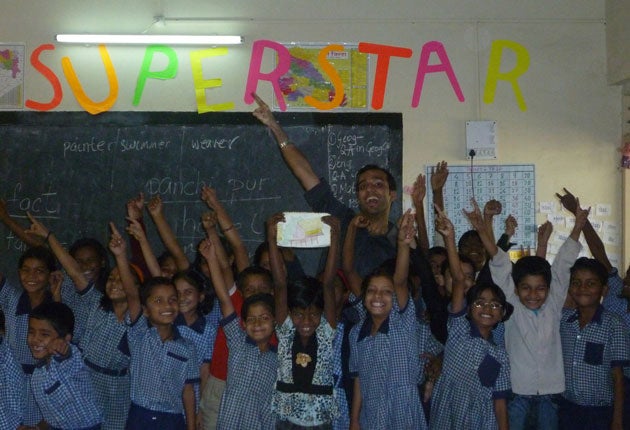Indian schools take lessons from top British graduates
Primary school children in Mumbai are benefiting from UK's groundbreaking Teach First scheme

It is barely 10am and shafts of hot sunlight are already boring through the classroom windows. Small girls in gingham dresses wriggle in their seats, while a little boy in blue shorts slumps over his sloping wooden desk, dozing. At the front of the class stands an energetic, 20-something teacher striving valiantly to teach 31 seven-year-olds long division.
Behind his head, on the grubby, once-cream walls, the word "Superstar" is emblazoned in fluorescent pink. A familiar scene in any primary school on a warm summer's day, but this isn't the home counties. The teacher wears a cotton kurta, rather than a shirt, and the eager faces gazing up at him are among the poorest children in India.
The pupils of Babu Jagjivan Ram school are thousands of miles from Britain – and a dusty four-hour drive from Mumbai – but they are, in a way, in the British education system: a UK-led teaching programme that is sweeping the world.
Maths lesson over, Saahil Sood, 27, dismisses his class. Most of the children bolt into the small yard, leaving just a few loiterers. Vaisha Vi, a wide-eyed nine-year-old, who often comes top of her class, is enthusiastic about the Bhaiya [brother] who now teaches her. "The teacher in standard two hits. The teacher in standard three doesn't hit," she tells me, playing with one of the long plaits that snake down her back. "We have extra lessons on Wednesday and Friday too, and the teacher goes over things that we have done in other lessons." She pauses, and the sound of the children playing drifts in through the open window. "He helps you. He doesn't hit."
If Vaisha stays in school for another year, she will be in the minority; more than 50 per cent of Indian children drop out by the age of 10.
She is one of 2,800 children currently being taught as part of the new Teach for India (TFI) scheme, which young Britons from Teach First – the popular scheme which parachutes graduates from top universities into some of the country's worst schools after just six weeks' training – are helping to establish.
While Mr Sood's pupils, whom he has taught for eight months, seem smitten with him, not everyone is convinced by his career choice. "For any parent in India, security is important, and teaching meant a pay cut of more than half," he says. "I'm at the age when people are settling down, and they asked me how I'd get a wife if I was a teacher."
Many of the teachers – known as "fellows" – are ostracised by their families as a result of turning their backs on "respectable" professions such as engineering and accounting to go back into classrooms.
Mr Sood, a former banker, is one of 87 fellows teaching in schools in Pune and Mumbai, a number that will increase to 230 in May. And like him, 65 per cent of the teachers left a well-paid job at a big city firm.
Break over, the children pour back into the school. While Mr Sood's class are quickly engrossed in a language game – in which the children gain a much-coveted marble if they do well – the neighbouring classrooms are eerily silent, with children sitting copying facts from text books.
"At first it followed the model of Teach First, but Teach for India is becoming more individual as it progresses," Lucy Helan, 27, an Oxford graduate, tells me. She moved to Pune to help establish TFI six months ago, after teaching in a city academy in London's Haringey for two years. Since 2008, "Teach For" schemes similar to Teach First have been established in many countries, including Latvia, Chile and Australia; while a further 12 countries are now establishing outposts.
While Teach First alumni have had a hand in setting up these schemes, Ms Helan says the model is adapted to suit each country's needs. "Our chief exec is very inspired by Gandhi, as are many of the fellows. She wanted us to understand it, so she booked us into Gandhi's ashram in Ahmedabad, and we spent a day paired with someone who lived in the slums," she says.
The chief executive in question, Shaheen Mistri, says her approach applies to all aspects of TFI. "We encourage fellows to go to children's homes," she says. "You see a child who falls asleep in class very differently if he sleeps in one room with the rest of his family and the TV is on until 1am."
She acknowledges that while Teach First has flourished in the UK since its inception in 2002 – last year 5 per cent of all Oxford graduates joined the scheme, and it is set to be the biggest graduate recruiter in the country by 2012 – creating a similar model in India has not been problem-free.
The charity is entirely funded by donations and will struggle to fulfil its ambitions to expand into up to 10 cities in the next five to seven years without government support. But Ms Mistri remains upbeat. "Giving good-quality education to low-income children can really turn around their lives."
Join our commenting forum
Join thought-provoking conversations, follow other Independent readers and see their replies
Comments
Bookmark popover
Removed from bookmarks